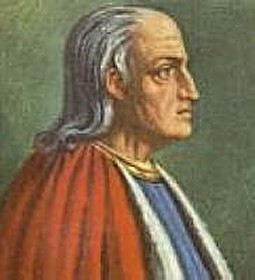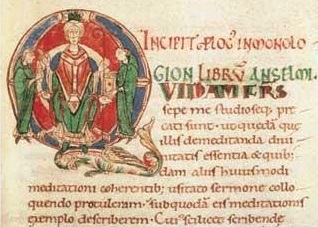
Holy Wednesday April 21st 1109
It was announced from Canterbury today that one of the most famous and influential men in Europe for the last half century has died peacefully at home in Canterbury at the age of 76.
Anselm had been Archbishop of Canterbury for sixteen years, six of which he spent in exile. A life-long Benedictine monk, happiest among the brothers in a monastery and famously spurning high office. Nevertheless he was prevailed on to accept, first, the Abbacy of Bec in Normandy and then, in 1093, the supreme office of the English church – the archbishopric of Canterbury.
Anselm was born in Aosta, then part of Upper Burgundy in 1033. His father, Gandulph was a Lombard noble who did not administer his estates as well as he might and eventually became a monk. His mother, Ermenburg, was nobly born and died in childbirth when Anselm was young. Anselm had a prosperous early life but regional turmoil depleted the family’s fortunes. He left Aosta and travelled for study, spending some time at the monastery of Monte Cassino, before moving on to the Abbey of Bec in 1059 where the famous Lanfranc of Pavia was Abbot.
Settling at Bec he became an exemplary monk and was eventually prevailed on to become Prior. When Lanfranc left the Abbey to become Abbot of St Stephen in Caen in 1063, Anselm was elected Prior of Bec.
In 1078 he was unanimously elected as Abbot of Bec in and ran Bec Abbey successfully for fifteen years, attracting scholars and monks from across the continent and grounding them in Benedictine rule while offering them the possibility of theological study.
Later, he was successful in placing many Bec-trained monks in prominent positions in Normany and elsewhere.

He himself wrote notable works of theology and divinity as well as the defence and justification of the finer points of doctrine such as The Proslogion, the Monologion, the Cur Deus Homo? Modest in his personal habits, he was demanding on behalf of the church, wresting respect from kings and princes, both here and on the Continent.
An inveterate wanderer, he spent time in Rome, Bari, Lyon, Troyes, and many times crossed the channel in his long life. He travelled to all the great courts and councils in England even when getting on in years. He suffered long periods of exile, being banished by William Rufus in 1097 and by Henry 1st in 1101. Eventual reconcilement in each case suggests his ability to adapt, although few would say that he was pliant in his views. Indeed some called him a dogmatist, a sore disappointment to the English church, who failed to defend its ancient liturgy and saints; others saw him as a shrewd and canny negotiator; still others as a man of unshakeable conscience and devoted upholder of canon law. Though by no means faultless or universally loved, he was regarded as an undoubted influence for good by monks, scholars and ecclesiastics here and abroad. He was not afraid to quarrel with kings when he thought them wrong. Ephemeral fame was never his goal. He maintained to the end of his life that all he ever wanted to be was a monk.
He leaves a legacy of instructive humanism to innumerable students who are today in deep mourning at Christchurch monastery.
He is survived by undying works of scholarship and the fame of a life well lived.
He will be buried in Canterbury Cathedral.